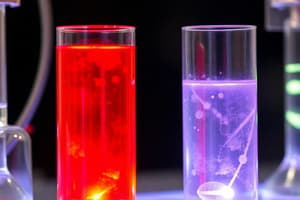Podcast
Questions and Answers
What branch of chemistry is Electrochemistry?
What branch of chemistry is Electrochemistry?
Electrochemistry is the branch of chemistry in which the relationship between chemical energy and electrical energy and their transformation are studied.
What is an electrochemical cell?
What is an electrochemical cell?
An electrochemical cell is a device in which the chemical energy of the redox reaction is converted into electrical energy.
Electrolytic cells convert electrical energy into chemical energy.
Electrolytic cells convert electrical energy into chemical energy.
True (A)
What is electrode potential?
What is electrode potential?
What factors does electrode potential depend upon?
What factors does electrode potential depend upon?
What is standard electrode potential?
What is standard electrode potential?
Flashcards
What is electrochemistry?
What is electrochemistry?
Electrochemistry explores the link between chemical energy and electrical energy, investigating their conversions.
What's an electrochemical cell?
What's an electrochemical cell?
A device where chemical energy from a Redox reaction is transformed into electrical energy.
What is an electrolytic cell?
What is an electrolytic cell?
An electrolytic cell converts electrical energy into chemical energy.
What is electrode potential?
What is electrode potential?
Signup and view all the flashcards
What factors influence electrode potential?
What factors influence electrode potential?
Signup and view all the flashcards
What is standard electrode potential (S.E.P.)?
What is standard electrode potential (S.E.P.)?
Signup and view all the flashcards
What are the conditions for standard electrode potential?
What are the conditions for standard electrode potential?
Signup and view all the flashcards
What is the symbol for standard electrode potential?
What is the symbol for standard electrode potential?
Signup and view all the flashcards
What are Redox reactions?
What are Redox reactions?
Signup and view all the flashcards
What is oxidation?
What is oxidation?
Signup and view all the flashcards
What is reduction?
What is reduction?
Signup and view all the flashcards
Where does oxidation occur in an electrochemical cell?
Where does oxidation occur in an electrochemical cell?
Signup and view all the flashcards
Where does reduction occur in an electrochemical cell?
Where does reduction occur in an electrochemical cell?
Signup and view all the flashcards
What's the driving force in an electrochemical cell?
What's the driving force in an electrochemical cell?
Signup and view all the flashcards
What is the cell potential?
What is the cell potential?
Signup and view all the flashcards
How does cell potential impact electron flow?
How does cell potential impact electron flow?
Signup and view all the flashcards
What does a positive cell potential mean?
What does a positive cell potential mean?
Signup and view all the flashcards
What does a negative cell potential mean?
What does a negative cell potential mean?
Signup and view all the flashcards
How do electrolytic cells work?
How do electrolytic cells work?
Signup and view all the flashcards
Why is electrochemistry important?
Why is electrochemistry important?
Signup and view all the flashcards
Study Notes
Electrochemistry
- Electrochemistry is the branch of chemistry studying the relationship between chemical and electrical energy, and their transformations.
- Electrochemical cells convert chemical energy into electrical energy, while electrolytic cells do the reverse.
- An electrochemical cell is a device that converts chemical energy from a redox reaction into electrical energy.
- Electrode potential (E) is the potential difference developed between an electrode and the electrolyte solution when a metal is dipped into its own ion solution.
- Electrode potential depends on the nature of the electrode, temperature, and the concentration of metal ions in the solution.
- Standard electrode potential (S.E.P) or (E°) is the electrode potential measured under standard conditions (25°C, 1 atm pressure, and unit concentration of ions).
Studying That Suits You
Use AI to generate personalized quizzes and flashcards to suit your learning preferences.




